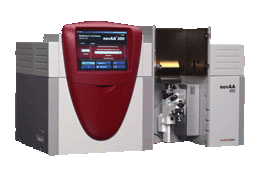
novAA® 300 - A system for routine operation with the features of a research grade spectrometer
Fully automated flame system with single beam (novAA® 315) and/or double beam (novAA® 330) mode and ith automatic 6-lamp turret, available as stand alone-system or with external PC.
Touch and go
The novAA® 300 stand alone-systems fascinate with a touch screen
interface and flexibility. A large, brilliant colour LCD touch screen
sets a new standard of operation. The Windows based software offers the
same excellent features as our well known WinAAS® software. By simply
touching the built-in screen the user is guided through the analysis!
Running samples will be easier than ever before. The "Quick Start"
routine makes method development as well as successful in less than six
steps. The best way for fast analysis and fast results! Different user
levels with selective rights make operation possible dependent upon the
users experience!
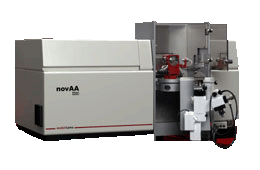
novAA® 400
PC-controlled fully automated compact spectrometer for flame and graphite technique with transverse heated graphite furnace, with single and double beam mode and with automatic 6-lamp turret.
Transverse-heated graphite furnace -
state-of-the-art in graphite AAS ...
... standard at novAA® 400
Precise measurement of trace elements over a wide concentration range while saving time, space and money - an assignment the novAA® 400 handles with:
- The high precision you would expect from our highperformance optics
- The speed required in a high-sample-throughput routine laboratory
- The robustness needed to withstand high salt concentrations in routine work
Automation
Let the novAA® 400 do the work for you. It controls not
only the temperature-time program for unknown sample matrices, but also
all instrument and accessory functions via software. Combined with the
graphite-tube autosampler, the instrument will measure your samples
over night - and even perform dilutions, should varying element
contents so require.
The core -
transverse-heated graphite furnace, always a step ahead
Today, transverse-heating is the state-of-the-art in graphite AAS. This
innovative concept is employed in all graphite furnace systems from
Analytik Jena.
Transverse-heating contributes significantly to the high performance of the graphite furnace and thus to the analytical efficiency of the entire system. Analytik Jena has been setting the standard on the AAS market for several years.
The transverse-heated graphite tube and the furnace are designed to guarantee constant temperature distribution in the graphite tube. This considerably reduces matrix influences and makes analysis almost free of memory effects.
The analytical advantages of transverse-heated graphite tube technology are obvious:
- Problem-free trace and ultra-pure analysis of real samples with varied matrices
- Loss of sensitivity and contamination interference, common with conventional longitudinally heated graphite tubes, are eliminated
- Even extremely low- volatility elements such as vanadium and molybdenum can be analyzed without difficulty
As an added economic advantage over the longitudinally heated tube, the transverse-heated tube has an atomization temperature several hundred degrees lower. This saves energy and considerably extends tube life.
Make your choice from our range of tubes:
- The pyrolyzed standard tube for simple up to difficult tasks
- Or the sophisticated Composite Tube-Platform system with PIN platform for complex applications
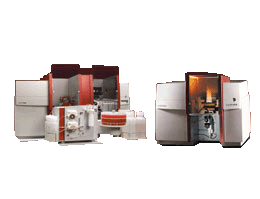
contrAA® — Here is a new technology that expands the field of atomic spectrometry: High-Resolution Continuum Source AAS
contrAA® 300 — The
High-Resolution Continuum Source Atomic Absorption Spectrometer
for Flame and Hydride Technique
contrAA® 700 — The High-Resolution
Continuum Source Atomic Absorption Spectrometer for Flame, Hydride and
Graphite furnace Technique
The better way to do atomic absorption
Analytik Jena brings an
innovation on the market — the contrAA® series — which exceeds the
performance of conventional AA spectrometers in all parameters.
This new technology — High-Resolution Continuum Source AAS — represents
previously unattained effectiveness
and quality of measurement results. Following decades of experience in
the development of spectrometers and graphite furnaces and in
cooperation with partners from leading research institutes, a vision
becomes reality — the start of a new generation in AAS, with the
contrAA® series, which finally closes the gap between ICP OES and AAS.
High-Resolution Continuum Source AAS (HR-CS AAS) covers the complete spectral range from the near vacuum-UV to the near infrared with a single continuum source, providing innovative capabilities. For the first time, genuine sequential multi-element analysis is implemented in AAS without the need for a multitude of different light sources.
At first glance:
- Maximum versatility and flexibility
- Guaranteed stability
- Improved accuracy
- Maximum information content
- Speed for higher efficiency
- New level of performance
- Fast sequential multi-element determination for flame AAS
- Simultaneous background correction
- Full post processing of measurement (FPP)
Unique Flexibility
The xenon short-arc lamp as a continuum source is ideal for any element
to be analyzed. No matter how frequently or seldom you have to
determine an element, the HR-CS AAS instrument is immediately ready for
measurement. You have every freedom for line selection, as the source
covers the entire continuous wavelength range. All absorbing atom lines
are immediately available, irrespective of the emission properties of
the HCL (such as windows transmissive to UV or visible radiation). In
addition, several new types of lines can be used for analysis.
Immediate Readiness for
Measurement
The immediate readiness for measurement provided by HR-CS AAS is due to
the fact that the lamp needs no fixed warm-up time to avoid output
drift. Innovative correction algorithms continuously compensate any
drift or fluctuation of the spectrometer including the source.
Improved Performance
HR-CS AAS features an improved signal-to-noise ratio and
markedly better detection limits. This is due to the higher radiation
density of the Xe continuum source compared to HCLs, and the enormously
increased quantum efficiency of a CCD semiconductor detector compared
to the photomultiplier tube commonly used in line-source AAS (LS AAS).
HR-CS AAS is the first technique that c an efficiently correct spectral
interferences in flame AAS by structured flames or molecule structures.
This provides improved simultaneous background correction, and
capabilities to correct spectral interferences to increase the accuracy
of analytical results.
contrAA® is closing the gap between ICP and AAS! As robust and interference-free as a traditional AAS system, yet the variety and speed of the information is comparable to that of an ICP - a combination which will satisfy all future requirements!
ZEEnit series - Recent technologies translated into a family of instruments that sets new standards
Decades of experience in the development of spectrometers, plus the most recent findings made in electronics, magnetic field technology and furnace design, have gone into the ZEEnit series (ZEEnit 600/650/700). The ZEEnit 700 completes yet another milestone in spectrometer development at Analytik Jena: A system that combines excellent analytical performance with a high degree of user friendliness.
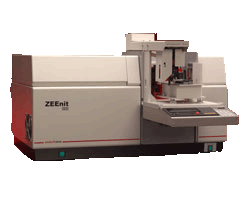
ZEEnit 600
Graphite furnace AAS with Zeeman background correction
ZEEnit 650
Graphite furnace AAS with Zeeman and deuterium background correction
The ZEEnit is a compact spectrometer with a
new-generation of magnetic field technology.
The instrument provides a wealth of unique benefits:
- Maximum integration of all components and minimum foot print
- Temperature stabilized transversely heated graphite furnace for problem-free trace analysis according to the principles of the STPF concept
- Sensorless true temperature control and unique emission independent temperature recalibration
- Variable power magnetic field to 1.0 Tesla.
- Unique 3 field mode for extension of the linear operating range.
- Directly combination of graphite furnace and hydride technique (HydrEA technique) for a higher efficiency of hydride analysis with clearly improved proof borders.
- WinAAS® software with a convincing concept for simple operation and optimization options for routine work inclusive extencive ones quality asscurance.
New options in direct solid analytics:
The newly developed transversely heated graphite furnace used in the ZEEnit 600/650 facilitates the introduction of liquid samples as well as direct solid sample feed. The combination of the transversely heated graphite furnace with powerful background correction forms the basis for optimal results. In addition, the development of a specially optimised sample holder allows the analysis of various solids from powders to sample pieces. The geometry of the holder guarantees the ideal atomisation conditions in the solids tube and reliable transport procedures for sample introduction. The different manual or automatic autosamplers SSA 6z and SSA 600 for solids make the use of ZEEnit for direct solid analytics childsplay. The 3-field mode opens up a multitude of new possibilities, as significantly greater contents can be measured without dilution in a wide range of samples.
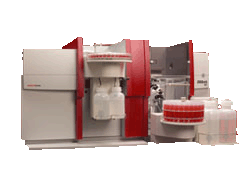
ZEEnit 700
Compact spectrometer for graphite and flame techniques with Zeeman and deuterium background correction
On the ZEEnit 700, the core competency in optical design has been combined with "High-end technology" in atomizers. The transversely heated graphite furnace with all its highlights ensures maximum accuracy and operation according to the STPF concept. The third-generation Zeeman technique is unsurpassed in background correction - the variable magnetic field combined with the three-field technique and the dynamic mode are the basis for an extended linear working range and optimum sensitivity! The flame system, too, features a high degree of automation. The optimized burner/nebulizer system ensures that samples are optimally nebulized and atomized. A multitude of accessories allows the user to customize the system to the specific analytical needs.
At first glance:- Two atomizers combined in a single instrument allow switching between flame, hydride and graphite furnace technique without any mechanical movement
- Transverse-heated graphite furnace
- Third-generation Zeeman technology
- Choice of two correction modes: Deuterium or Zeeman background correction
- Automatic optimization routines for, Flame composition and burner height
- Atomization and pyrolysis temperature, Magnetic field strength, two-field and three-field correction mode
- Direct solid AAS
- Intelligent sample-preparation stations
- High sample throughput, variability and efficiency ensured through the dual atomizer concept
- Modern software
Well thought-out concept for automated flame and hydride technique
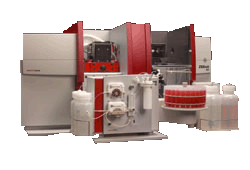
- High sample throughput, variability and efficiency ensured through the dual atomizer concept, modern software modules and versatile accessories.
- Improved accuracy even with varying samples and element contents through the combination with fully automatic, intelligent samplers with integrated dilution function.
- Unique background baseline correction for optimum operation in emission mode.
- Efficient atomization of all samples by the combination of an adjustable impact bead and an atomizer with an inert mixing chamber.
- Fully automatic gas control by Total Flow gas box and - in combination with automatic burner height adjustment - automatic optimisation of flame parameters.
- Injection technique with the SFS 6Segmented Flow Star for high matrix loads of samples, injection of small sample volumes and stable burner conditions.